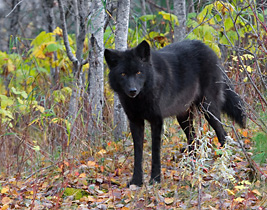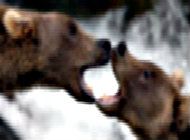February 7, 2012
The mass slaughter of wolves over the centuries in North America has caused more damage then we could ever have guessed. As far-fetched as it sounds it could push wolves to extinction.
A 2004 study in New Scientist found wolves in Canada have lost 43% of the their genetic diversity. This is very concerning, it means wolves are becoming increasingly inbred. This can effect them negatively in so many ways. Weaker immune systems unable to fight off disease, skeletal deformities, the inability to withstand increased hunting pressure, smaller litters. It’s a shocking find, yet very little attention has been given to this important study.
The hunt slaughter, taking place in the Northern Rockies, could have far-reaching implications. The 432 wolves who’ve been killed in the hunts took their genetics with them, they won’t be coming back. All this killing is weakening the wolf. Could they be wiped out by an epidemic, due to their diminished genetic diversity?
Are either of the fish and game agencies in Montana and Idaho concerned about wolves loss of genetic variability? Isn’t it their job to know and care about this? What about Yellowstone wolves? Their numbers have crashed several times. The iconic Druid Peak Pack is gone, taken down in large part by mange mites they were unable to fight off.
When Judge Molloy presided over the 2009 delisting lawsuit there were several issues raised supporting wolves relisting, including the lack of genetic connectivity of the three wolf sub-populations (Idaho, Montana, Yellowstone NP). Unfortunately his ruling focused on just one, the USFWS decision to delist Montana and Idaho wolves, while keeping Wyoming wolves listed. Once Judge Molloy returned wolves’ protections, in August 2010, the anti-wolf forces went to work and lobbied Congress to remove Northern Rockies wolves from the ESA, without judicial review. Sadly, the science was not mentioned again.
===
New Scientist
Wolf eradication in the US has had a far more devastating impact on the genetic diversity of remaining populations than previously thought, a new study reveals.
Although wolves were systematically eradicated across North America over the last couple of centuries, it had been thought that the human impact on the Canadian wolf population – which is currently a relatively healthy 70,000 – was minor.
Conservationists therefore assumed that the Canadian population had the same level of genetic diversity that had existed in the 19th century – prior to the mass slaughter – and that small-scale re-introductions of these wolves into the US would lead to diversity on a par with this earlier period.
But these assumptions were wrong, according to researchers from the University of Uppsala, Sweden, and the University of California Los Angeles, US, who looked at the genetic diversity of the original wolf populations using DNA analysis. They used bone samples taken from grey wolves dating from 1856 – held in the National Museum for Natural History in Washington DC – and compared this genetic diversity with that of modern wolves.
“We found a 43% drop in genetic variability in the modern wolves,” said Carles Vila, one of the team. “It is impossible for the wolf populations to recover this important diversity, which enables them to adapt to different environmental challenges.”
Bears and lions
Vila notes: “It takes thousands of years of naturally occurring mutations to build up such diversity. And if the Canadian wolves – with such a large population remaining – have lost so much genetic variation, what is the situation for other endangered species in North America, such as bears or mountain lions?”
Wild wolves from across North America were captured and reintroduced to the Yellowstone National Park in Wyoming, US, 10 years ago with considerable success. For example, the population of elk was reduced to more sustainable levels, allowing vegetation to recover.
It was hoped that choosing wolves from across the continent would produce a population with high genetic diversity. But the new research shows this has not happened.
Isolated pockets
The researchers suggest the wolves’ limited genetic variation will make them more vulnerable to factors such as disease or environmental change, limiting the pack’s ability to survive in adverse conditions.
“The species now exists in such isolated pockets that it is impossible for them to breed across the gaps, so genetic diversity will continue to fall,” Vila told New Scientist.
Read more: http://www.newscientist.com/article/dn6730-wolves-genetic-diversity-worryingly-low.html
===
In 2007, geneticist, Dr. Ken Fischman, Ph.D, testified at an IDFG open house on Idaho’s then wolf management plan.
Testimony Concerning The Idaho Wolf Population Management Plan – 2008
Idaho Fish & Game Open House
Coeur D’Alene, Idaho, December 12, 2007
Genetic Problems in Small Populations of Idaho Wolves
Ken Fischman, Ph.D.
Sandpoint, Idaho 83864
Ladies/Gentlemen:
My name is Ken Fischman, and I live in Sandpoint, Idaho. I have a Ph.D. in Genetics, and over 30 years of experience in Genetic research. I wish to address the question of the number of wolves in Idaho that would constitute a genetically viable population.
Everyone has been impressed by the rapid increase in Wolf numbers since their reintroduction. However, that was to be expected when wolves were first introduced into this area, in which the ecological niches for large carnivores were previously quite open. As these niches are filled, wolf reproduction will likely slow down.
I would like to put the 673 wolves in Idaho in geographical and comparative perspective. The size of Idaho is 82,751 square miles. That works out as one wolf for every 123 square miles. The Human population is more than 1,240,000, which means one wolf for every 1,842 people.
ID F&G has proposed a minimum of 100 wolves and 15 Breeding Pairs as a statewide objective.
A key principal in Population Genetics is that what is important for species preservation is not the total population, but the number of Effective Breeders. ID F&G estimates that there are currently no more than 42 Effective Breeding Pairs in Idaho.(that is, wolves, not people)
Because only a small fraction of a pack reproduces, that further decreases the genetic pool. If Idaho’s wolf numbers are reduced to this level, it could lead to severe inbreeding, thus decreasing their genetic diversity, and making them more prone to a population crash under a variety of circumstances.
The concept that the existence of over ten breeding pairs of wolves should justify removing wolves from the Endangered Species list is therefore biologically insupportable. It is clear therefore, that this was a political, not a scientific decision, and has no basis in any established genetic or evolutionary principles.
Inbreeding is far from the only danger to small populations. Even under the best of circumstances, the lives of wolves are precarious. Any one of dozens of natural or man-made calamities, which could be weathered by large, dispersed populations, such as a virus epidemic, an unusually severe winter, change of climate, or loss of habitat, could wipe out such a small number of animals almost overnight, with permanent loss of their gene pool.
Population Genetics guidelines estimates that a Minimal Viable Population is 500 individuals, and I calculate that the Number of Effective Breeders should be at least 50 pairs.
Under any other circumstances, and with almost any other animal population, the numbers of wolves in ID F&G’s Statewide Objective would be considered, not a success, but a population in danger of extinction.
This is the likely outcome if the number of Idaho’s wolves is reduced to the level ID F&G has proposed.
No, in a manner of speaking, these wolves are not out of the woods yet. A much larger, genetically diverse, and widespread population would be needed if wolves are to become once again a stable, permanent part of the forests of the Northern Rockies.
Thank you for your time and attention.
====
What happens to a species when genetic diversity declines? Look to the wolves of Isle Royale.
Bone Deformities Linked To Inbreeding In Isle Royale Wolves
Science Daily
ScienceDaily (Apr. 2, 2009) — The wolves on Isle Royale are suffering from genetically deformed bones. Scientists from Michigan Technological University blame the extreme inbreeding of the small, isolated wolf population at the island National Park in northern Lake Superior.
http://www.sciencedaily.com/releases/2009/04/090402171440.htm
===
Wolves will never regain the genetic diversity they once had. Instead of conducting more research into wolves decreasing genetic variability, it seems “wolf managers” will just try to guess if the mass slaughter of wolves in the Idaho and Montana hunts will weaken the species even further. Russian Roulette anyone?
====
Photo: Courtesy Nature Cold Warriors
Posted in: Wolf Wars, biodiversity
Tags: wolves decreasing genetic diversity, Dr. Ken Fischman, Ph.D, IDFG, University of Uppsala, Sweden, UCLA, wolf inbreeding








 Boulder White Clouds Council
Boulder White Clouds Council Exposing The Big Game
Exposing The Big Game Footloose Montana
Footloose Montana Friends of the Clearwater
Friends of the Clearwater Lockwood Animal Rescue Center
Lockwood Animal Rescue Center Louise du Toit
Louise du Toit LUPUSLAETUS
LUPUSLAETUS Mercy For Animals
Mercy For Animals Northern Idaho Wolf Alliance (NIWA)
Northern Idaho Wolf Alliance (NIWA) Predator Friendly®- Because Wildlife Matters
Predator Friendly®- Because Wildlife Matters Project Coyote
Project Coyote Project: Wolf
Project: Wolf The Nature Conservancy
The Nature Conservancy The Ravensong Group
The Ravensong Group WildEarth Guardians
WildEarth Guardians Wisconsin Wildlife Ethic-Vote Our Wildlife
Wisconsin Wildlife Ethic-Vote Our Wildlife Wolf And Wildlife Studies: Jay Mallonee (Independent Wolf Biologist)
Wolf And Wildlife Studies: Jay Mallonee (Independent Wolf Biologist) Wolf Song of Alaska
Wolf Song of Alaska Wolves in english ! Les loups en anglais !
Wolves in english ! Les loups en anglais ! WWP's Gray Wolf Page
WWP's Gray Wolf Page Yellowstone To Yukon Conservation Initiative
Yellowstone To Yukon Conservation Initiative
I continue to be appalled at the wanton slaughter of such magnificent animals. I have been a hunter all my life and I understand the delicate balance in nature that these beautiful animals help maintain. I always had been an advocate of keeping the wolf population in check through hunting until last year when a Malamute Timber Wolf hybrid came to live with me. My attitude towards the wolf was changed forever. Scout is my best friend and follows me everywhere. If I leave him behind I can hear him howl for me until I am out of earshot. He is light colored with blue eyes that seem to peer into my soul. He is extremely smart and is always eager to help with whatever I am doing to the point that my task more often than not ends in laughter at his hysterical antics. I often reflect on my own previous ignorance regarding these majestic animals and thank Scout everyday for opening my eyes. We need to let these animals live their lives in peace and without fear as they were here long before we were.
LikeLike
Thank you so much Kerry for sharing your story concerning your beloved Scout. Since wolves are the close ancestors of dogs, they share 99.98 percent of their DNA, I’m not surprised Scout has led you down this road, it’s wonderful to hear!
For the wolves, For Scout,
Nabeki
LikeLike
You just inspired a soul, we’ll done. Truly you understand and I have always wanted to own a wolf, but it’s inspiring to hear the story about it. #HowlingForJustice.
Thank you truly.
LikeLike
I am a Native American hunter and this senseless slaughter is very disgusting.All wanton killing for mans greed needs to STOP.Wolves,a top predator are much needed in their natural environment.Mans greedy slaughter only makes the murderers less human than the animals.
LikeLike
Sadly, those who control the wolves’ fate are indifferent to vital issues such as genetic diversity. They simply don’t care. Only when a significant portion of Americans really raise hell about our current wolf “management” plan will wolves be treated fairly.
LikeLike
They don’t have a voice people! The wolves can’t speak up, they can only howl. And through my ears I hear a lot of howls, and then they fade away. One by one.. Because people destroy it. I would die for a wolf. Over all the killing’s the hunting.. They have been howling for help!! And we try to take a stand.. The president tries.. We try. People who have hearts try!!!! And it never goes through, I go in tears when I hear things happen, this comment is not just for this post, but for all the posts that’s been happening of the wolves, I hear a howl each time. I. Read. A post. Nebeki, your amazing you did so much, you care so much when something happens for a wolf you post it. And we listen we care about what you care about. Your. Amazing. I look up to you and I don’t even know you, but I know your a wolf lover, and that’s all I need to know to call you a friend. #HowlingForJustice. #WolfPrayer #StayAndHideWolves. #BeYou.
For the wolves, for the lovers once again
#howlingForJustice.
LikeLike
As a biologiy student I am deeply saddened by the loss of genetic diversity in any species, especially when it occurs in a highly polymorphic species like the wolf. Genetic variation is important for all species, and those with little variation are at higher risks of extinction due to their inability to adapt. Let’s do what we can to protect the wolves that remain – and their genetics!
LikeLike
THEY NEED TO STOP KILLING AND HUNTING WOLVES!!!! YOU WOULDN’T SHOOT YOU DOG IF IT KILLED A CATTLE ANIMAL, WHY WOULD YOU KILL A WOLF?!?!?!?! THEY ARE NOT GOD, THEY HAVE NO RIGHT TO PLAY GOD, AND IF THEY THINK THEY DO THEY GOT ‘NOTHER THING COMING!!!
LikeLike
Reblogged this on Exposing the Big Game.
LikeLike